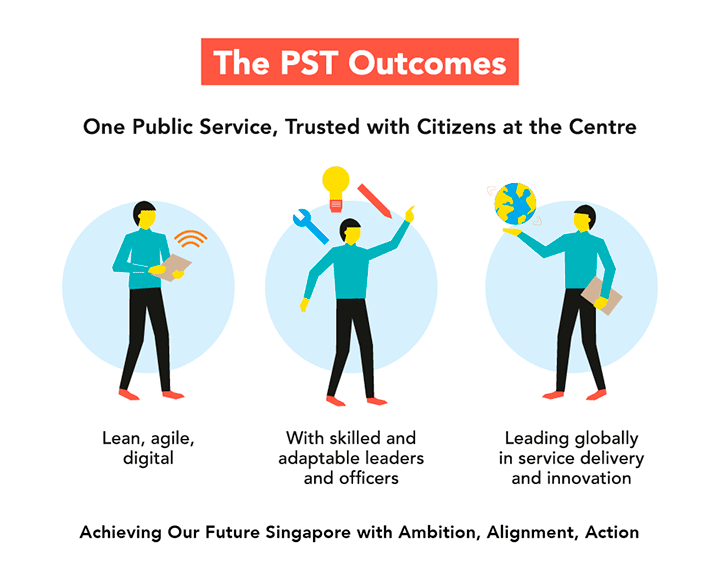HCS Leo Yip: The Way Forward For Public Sector Transformation

Challenge last spoke to Mr Leo Yip in 2012, when he was Chairman of the Economic Development Board. Back then, he had already stressed the importance of leadership and partnerships in tiding Singapore through an economic downturn.
It is no surprise then, that now as Head, Civil Service, Mr Yip continues to focus on leadership, this time for a successful Public Sector Transformation (PST).
Mr Yip launched the latest phase of PST in January this year.
Embracing change with purpose
PST is not change for change’s sake, Mr Yip says, but a movement with a “higher purpose”, a belief that there is a better future for Singapore, and all public officers have a part to play in creating that better Singapore.
To get there, the Public Service must first transform itself, coherently, purposefully and collectively.
When everyone shares a clear purpose, changing mindsets to embrace change gets easier. “Change can be uncomfortable, change can even be painful”, acknowledges Mr Yip, but it is possible when everyone understands and agrees what it is for.
The driving forces for change
New and disruptive technology, an ageing population and a stagnating local workforce, and a changing society are just some of the challenges that Singapore and the Public Service face.
“We cannot expect our citizens and businesses to embrace digitalisation, ageing, SkillsFuture, and so forth, if the Public Service does not first lead the way itself.” Summarising the momentous impact of what this means, Mr Yip says: “Fundamentally, we cannot continue to operate the way we do today”.
An approach for pervasive change
A recurrent word that Mr Yip uses is “pervasive”.
He says that changes have to be pervasive across the Public Service. “PST applies to everyone – every ministry and every part of the Public Service”.
However, each ministry’s work and immediate operating environment is different. Hence, every ministry has to respond, he adds, in their own way to the challenges that the Public Service will face as a whole.
And in order to realise this transformation, Mr Yip says that change needs to cover “the way we operate in the future, how our ministries can be better organised, how our work processes need to be revamped, how we should push ahead with digitalisation and so on”.
Each Ministry Family is developing and implementing a transformation and digitalisation plan, tailored to its unique circumstance and to systematically address the areas above.
A vision for success
Mr Yip characterises this next phase of PST with three As: ambition, alignment, and action.
For the Public Service, this means to aim higher, work together and make things happen.
There is already plenty of good work being done across the Public Service, Mr Yip says. Still, “it’s always the next bound of ambition and possibility that we should all be striving towards,” he urges.
The Public Service must aim to keep building a better Singapore, one that is a lot more exciting as an economy, a society, a city and a nation. He added: “We in the Public Service must always strive to create a better Singapore and a better life for Singaporeans, and that means we must have a strong sense of ambition for Singapore.”
And in today’s more complex environment, better outcomes will be achieved by working together, rather than having each ministry or agency dealing with changes on their own.
“A thousand flowers blooming doesn’t give you a garden” is a phrase Mr Yip has used in previous speeches. This means our transformation efforts cannot happen in isolated, uncoordinated pockets.
Alignment, then, means working as One Public Service, towards a common agenda, a common direction, responding to challenges and turning them into opportunities in a coordinated way.
Mr Yip also hopes to bring a stronger sense of action to the next phase of PST.
“No ministry becomes better by just talking about new ideas,” he says. “Every ministry becomes better only when it gets things done in a better way – and having the public benefit from that.”
Only by translating good ideas into action will public officers and citizens get the tangible benefits of PST, such as a digital government that serves citizens better, with ministries that run better to provide better services.
Watch Mr Yip’s speech about the three As.
Addressing anxieties, building confidence
Mr Yip notes that as “major adjustments and adaptations” happen along the way, the leadership will be pivotal as a guiding force.
“There will be anxieties. It's the job of the Public Service leadership to help all our officers go on this journey, address those anxieties and take the necessary steps to help everyone make those adjustments.”
The adjustments could include re-skilling to operate in a digital environment, taking on new work and new posts, and moving from one part of the organisation to another.
Mr Yip calls PST an ongoing “change management journey”, during which leaders will have to find balance between people and tasks, processes and outcomes.
Any changes introduced, such as automation, must be communicated clearly and mindfully so that public officers understand the reasons for them, and how they can contribute.
“We need to build confidence that this is a journey public officers are not asked to embark on their own – this is a journey where their leadership is not only leading from the front, but is also fully behind them.”
Generating momentum
In the months ahead, Mr Yip says that new initiatives will be rolled out for officers to come on board the transformation journey. Most recently, at the PST Conference during Public Service Week, he shared about the PST outcomes.

He hopes that in the months ahead, these positive changes will be real and impactful for every officer. And the “real litmus test” he says, “is that the public feels that [the transformed Public Service] leads to better services for them, and slowly but steadily, a better future Singapore that will emerge from this”.
- POSTED ON
Aug 3, 2018
- TEXT BY
Tuber
- PHOTOS BY
Public Service Division









